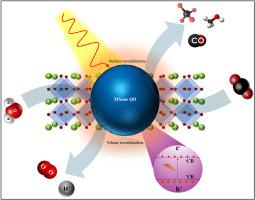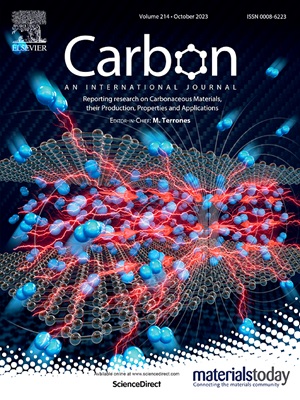催化转化二氧化碳的新兴二维 MXene 量子点
IF 10.5
2区 材料科学
Q1 CHEMISTRY, PHYSICAL
引用次数: 0
摘要
由于其强大的物理和化学特性,MXene 是一种将二氧化碳(CO2)转化为有价值产品的新兴材料。MXene 的高比表面积(SSA)、导电性和稳定性使其成为催化转化 CO2 的一种极具吸引力的材料。与它们的复合材料相比,原始的 MXene 催化性能较差。本研究简要讨论了 MXene 和 MXene 量子点 (MQDs) 的神奇特性和先进的合成路线。此外,还详细讨论了氧化 MXene 可改变其化学成分,以及氧化 MXene 的因素。此外,还讨论了二氧化碳的氢化、化学、电催化和光催化还原机制。最后,还首次介绍了用于光催化转化二氧化碳的 MXene 量子点(MQDs),并展望了与 MXene 相关的未来挑战和前景。本文章由计算机程序翻译,如有差异,请以英文原文为准。

Emerging 2D MXene quantum dots for catalytic conversion of CO2
MXene is an emerging material for converting carbon dioxide (CO2) into valuable products because of its robust physical and chemical properties. The high specific surface area (SSA), conductivity, and stability of the MXene make it an attractive material for the catalytic conversion of CO2. The pristine MXene possessed poor catalytic properties as compared to their composites. This study briefly discussed the magical properties and advanced synthesizing routes of MXene and MXene quantum dots (MQDs). In addition, the oxidation of the MXene is responsible for altering its chemical composition, and the factors used to oxidize the MXene were discussed in detail. Furthermore, the mechanism of hydrogenation, chemical, electrocatalytic, and photocatalytic reduction of CO2 has been discussed. Finally, the MXene quantum dots (MQDs) for photocatalytic conversion of CO2 for the first time also present the future challenges and prospectus associated with MXene.
求助全文
通过发布文献求助,成功后即可免费获取论文全文。
去求助
来源期刊

Carbon
工程技术-材料科学:综合
CiteScore
20.80
自引率
7.30%
发文量
0
审稿时长
23 days
期刊介绍:
The journal Carbon is an international multidisciplinary forum for communicating scientific advances in the field of carbon materials. It reports new findings related to the formation, structure, properties, behaviors, and technological applications of carbons. Carbons are a broad class of ordered or disordered solid phases composed primarily of elemental carbon, including but not limited to carbon black, carbon fibers and filaments, carbon nanotubes, diamond and diamond-like carbon, fullerenes, glassy carbon, graphite, graphene, graphene-oxide, porous carbons, pyrolytic carbon, and other sp2 and non-sp2 hybridized carbon systems. Carbon is the companion title to the open access journal Carbon Trends. Relevant application areas for carbon materials include biology and medicine, catalysis, electronic, optoelectronic, spintronic, high-frequency, and photonic devices, energy storage and conversion systems, environmental applications and water treatment, smart materials and systems, and structural and thermal applications.
 求助内容:
求助内容: 应助结果提醒方式:
应助结果提醒方式:


